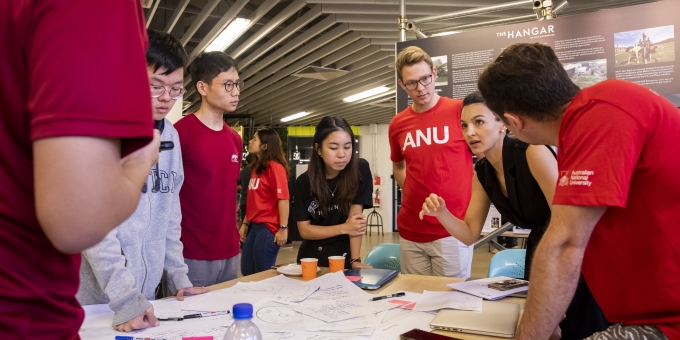Imagine this: you’re on a night out with friends, enjoying a couple of drinks at the local bar. Your friend offers you another drink – but you have to drive home. Instead of guessing, and making a potentially fatal mistake, you just check an app on your phone. It tells you in real time your Blood Alcohol Concertation (BAC), from information transmitted by a wearable technology device.
This was the idea that the winning team pitched at the first ever ANU Hackathon in Singapore. Over the weekend of 28 – 30 June, The Australian National University (ANU) and collaborators from the Singapore innovation ecosystem hosted a competition to give Australian and Singaporean students the opportunity to make a difference.
Over two days students from ANU TechLauncher, ANU higher degree research programs, and Singaporean higher education institutions competed in mixed teams to solve a wicked problem – how to improve public health.
This bold event was facilitated by hack experts from the Canberra Innovations Network (CBRInn) ANU TechLauncher program convener Dr Charles Gretton, and students from the National University of Singapore Entrepreneurship Society on location at The Hangar at the National University of Singapore (NUS).
This international, cross-cultural interdisciplinary event was the first event of its kind from both universities.
Students were challenged to be ‘health minister for a day’, and consider how they would spend the billions of dollars at their disposal.
The winning team, made up of a combination of Australian and Singaporean students: Kit (NUS), Jennifer (ANU), Liza (ANU), Jing Feng (NUS) and Engracia (NUS), pitched the ‘Tipsy’ platform:
“This application continuously monitors your BAC through a small patch on your skin and advises you through your phone when you are in the ‘green, orange or red’ zone, empowering you to make good decisions with your own data”.
For their inventive pitch, the team (pertinently called ‘The Fun Police’) went home with AU$7,000 in prize money, with the runners up sharing AU$2,000, and the 3rd place team receiving AU$1,000.
Other entries included an app to incentivise road users to not to text and drive, a tracking system to improve workplace stress, and an app to identify healthy food choices on university campuses.
There were several dignitaries present at the pitch night, including Leonie Muldoon, Senior Trade Commissioner at Austrade and Anand Sachdev, Chief Executive at Westpac. Held at the Westpac Co-Lab in Singapore, the students received unique insights into the thriving Singapore innovations scene.
Professor Michael Cardew-Hall, Pro-Vice Chancellor (Innovation) led the ANU delegation and was thrilled with the ideas presented.
“I am always humbled by the talent of our students and what they can do in such a short space of time. The outcome of the Health Hack exceeded our expectations” he said.
To help with the decision making process, the teams had help from mentors, specialised computer software and experts, including Science Communications experts, Entrepreneurs and a Field Epidemiologist.
The development of technical solutions to health problems can have far reaching impacts beyond their immediate benefits, including economic and social.
Ecosystem partners for the ANU Hackathon included: National University of Singapore Enterprise, NUS Entrepreneurship Society, Padang&Co, CATALYST, Canberra Innovation Network, SG Innovate, and Westpac Co.Lab.
Leading innovation initiatives such as this Hackathon is an important step for the ANU as it continues to transform Engineering and Computing, to being at the forefront of world-changing tech.
By Ellen Parsons

